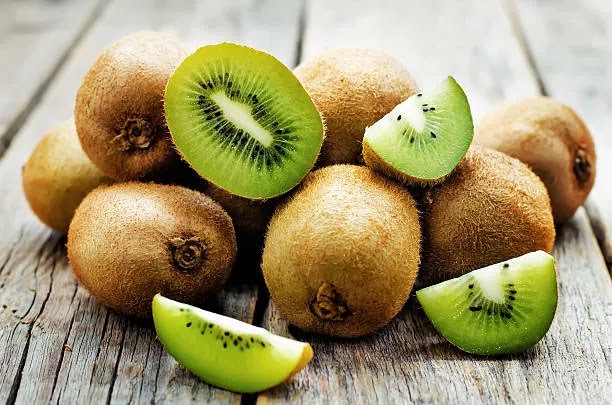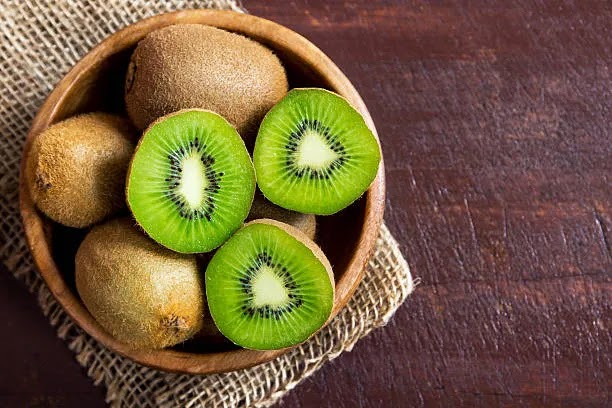Are they as healthy as some
claim? We asked an expert.
Kiwis are a tropical treat that can be enjoyed almost any year.
They are fuzzy on the outside and neon green on the inside. (Some types are
available from October to May in North America, while others are available from
late spring through fall.) These unique-looking oval fruits add bright color
and tangy flavor to salads, smoothies, desserts, etc.
Kiwis are highly nutritious. They are, after all, high in fiber,
folate, and vitamins C and E. No matter what anybody told you on the grade
school playground, their white center isn't toxic. But what happens when you
eat kiwi regularly?
We looked into the science of how kiwis affect your body, so
you'll know everything there is to know.
1. You'll boost heart health.
We've all heard that overeating sodium is bad for your heart, but
the balance of sodium and potassium (rather than just overdoing it with the
salt shaker) can often give you a more accurate picture of your risk of heart
disease.
"Sodium and potassium support water balance, heart rate,
blood pressure, cell hygiene, and muscle health when consumed in appropriate
amounts," says dietitian Lauren Minchen, MPH, RDN, CDN, nutrition
consultant for Freshbit, an AI-driven visual diet app.
Because kiwi is rich in potassium—and contains almost no
sodium—it's an excellent food for your ticker.
"Prioritizing potassium-rich foods like kiwis can help boost
potassium, which offsets sodium's negative effects on blood pressure, heart
rate, and water balance," Minchen says.
Kiwis are moderately high in fiber, with just over 2 grams per
fruit, adding to their heart health punch. According to research, high-fiber
diets have been linked to a lower risk of cardiovascular disease and can even
help you lose weight.
2. You'll enhance your digestion.
When it comes to fiber, we must also consider digestion. Including
plenty of fiber in your diet has proven benefits for decreasing constipation
and diarrhea and cultivating a healthy microbiome. But the digestive benefits
of kiwi don't end there. Actinidin, a kiwi enzyme, was shown to help break down
protein in the digestive tract in a 2010 study.
3. You'll promote better vision.
Kiwis are rich in two antioxidants that you may never have heard
of—lutein and zeaxanthin—but they have an essential role in ocular health.
These are the only carotenoid compounds that accumulate in the retina. They
protect the eyes from damage by keeping free radicals out of the cells—the
result: a possible slowing of the formation of cataracts and macular
degeneration. Minchen suggests a salad of leafy greens, tomato, sunflower
seeds, and kiwi with balsamic vinaigrette to help your eyes.
4. You could ward off iron-deficiency anemia.
Move over, oranges! With 56 milligrams per fruit, kiwis are their
vitamin C powerhouse. For men, that's 62 percent of the recommended daily
intake (RDI), while it's 75 percent for women.
Including plenty of vitamin C in your daily diet can help avoid
anemia by improving your body's iron absorption.
"When paired with iron-rich foods as part of an iron-rich
diet, kiwis can help boost iron absorption, which can help treat
iron-deficiency anemia," Minchen explains.
5. You might lose weight.
Single kiwi fruit contains only 44 calories—an itty-bitty amount
compared to many other sweet snacks. Replacing higher-calorie foods with a
juicy green kiwi (or two!) can help you lose weight by reducing your daily
calorie intake. A 2018 study (granted, was funded by a significant kiwifruit
marketer, Zespri International) found that people who ate two kiwis per day for
12 weeks significantly reduced their waist circumference and waist-to-hip
ratio.
6. You'll keep steady blood sugar.
Do you know what the glycemic index is? On a scale of 0 to 100,
this ranking system explains how much different foods raise your blood sugar.
Kiwi is in the bottom range of fruits, with a score of about 50. This is a
major positive, especially for people with diabetes, according to Minchen.
"Eating low glycemic foods is especially beneficial for
diabetics since these foods can help support natural blood sugar
management," she says. "Because low glycemic foods don't cause a big
spike in blood sugar, you don't need as much insulin in your bloodstream to
deal with the spike after meals."
Try a smoothie with kiwi, Greek yogurt, macadamia nut milk, and a
sprinkle of coconut if you're seeking something sweet but don't want to deal
with the ups and downs of a glucose rollercoaster.
7. You might increase your risk of kidney stones.
Eating many kiwis isn't the same as going on a culinary tropical vacation for some people. A fruit salad of these bright green fruits may be an unpleasant experience for one health condition. Kiwis are high in oxalate, a plant chemical that can raise your risk of kidney stones. If you're prone to these painful-to-pass stones, it's wise to cut back on high-oxalate foods—so put kiwi on your list of "sometimes" foods.








